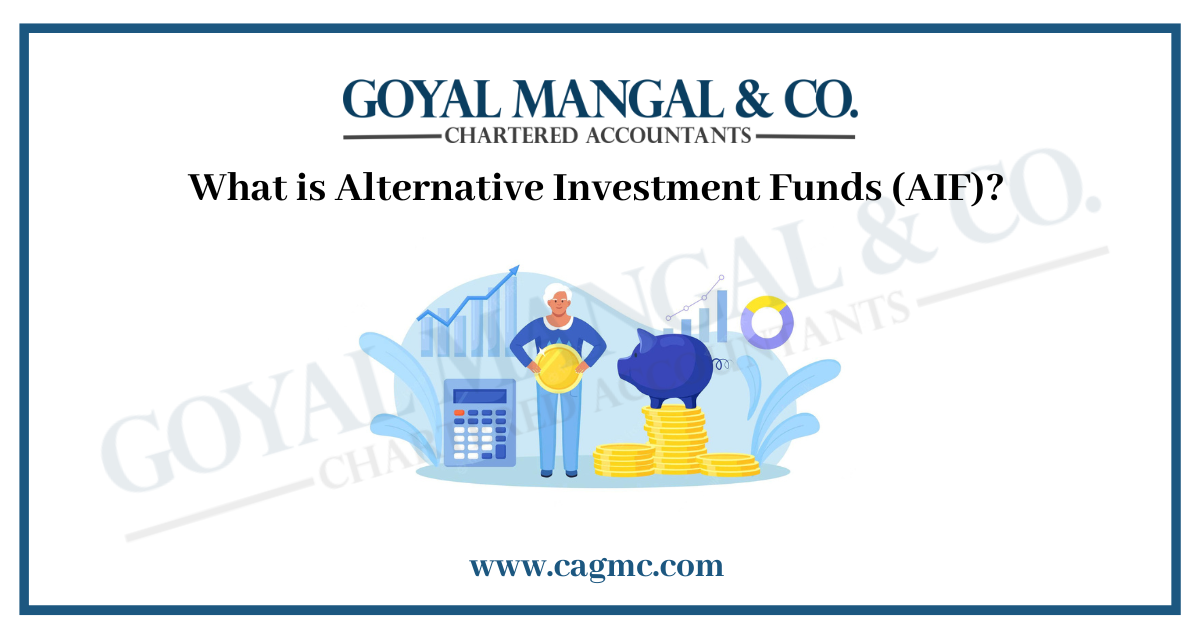 This article briefly describes What is Alternative Investment Funds, & the Benefits of investing in Alternative Investment Funds (AIF). An Alternate Investment Fund (AIF) refers to an investment that differs from conventional investment avenues such as stocks, debt securities, etc. An Alternative Investment Fund is a type of investment that is distinct from traditional investments such as debt securities, equities, and so on. It is an investment opportunity for high rollers in India, involving both domestic and foreign investors. AIF is often invested in by institutions and high-net-worth people since it requires a large initial commitment.
This article briefly describes What is Alternative Investment Funds, & the Benefits of investing in Alternative Investment Funds (AIF). An Alternate Investment Fund (AIF) refers to an investment that differs from conventional investment avenues such as stocks, debt securities, etc. An Alternative Investment Fund is a type of investment that is distinct from traditional investments such as debt securities, equities, and so on. It is an investment opportunity for high rollers in India, involving both domestic and foreign investors. AIF is often invested in by institutions and high-net-worth people since it requires a large initial commitment.
|
Table of Contents |
Quick Look
In India, an Alternative Investment Fund (AIF) is a form of investment vehicle. AIF may be used by investors to both invest and benefit. It is a mutual fund of mutual funds that invests in assets other than bonds, equities, and cash. It combines investor money and invests them in several investment categories authorized by the Securities and Exchange Board of India (SEBI) for the benefit of investors.
AIFs are privately pooled investment funds that invest in private equity, venture capital, hedge funds, managed funds, and so on.
Meaning of Alternative Investment Funds (AIF)
Alternative Investment Fund or AIF means any fund established or incorporated in India which is a privately pooled investment vehicle that collects funds from sophisticated investors, whether Indian or foreign, for investing it in accordance with a defined investment policy for the benefit of its investors. Alternative investments tend to have high fees and minimum investments, compared to retail-oriented mutual funds and ETFs. They also tend to have lower transaction costs, and it can be harder to get verifiable financial data for these assets. Alternative investments also tend to be less liquid than conventional securities, meaning that it may be difficult even to value some of the more unique vehicles because they are so thinly traded.
Types of Alternative Investment Funds (AIF)
The following are the Types of Alternative Investment Funds (AIF):
- Category I of Alternative Investment Funds: Investment of funds in start-ups or early-stage ventures Small and Medium Enterprises(SMEs) or any other sector considered as economically or socially viable by the government are part of this category. As they have a multiplier effect on the economy when it comes to growth and job creation, the government promotes and incentivizes such kinds of investment in these projects.
- Venture Capital Fund: Venture Capital Funds primarily invest in start-ups that have high growth potential but face capital issues in the initial phase and require funds to establish or expand their business.
- SME Fund: The fund usually invests in unlisted private companies which are micro, small, and medium enterprises, and incorporated under the Micro, Small, and Medium Enterprises Development Act, 2006.
- Infrastructure Fund: The fund invests in the development of public assets such as road and rail infrastructure, airports, communication assets, etc, and if are socially desirable or viable projects. Further, as these funds are being invested in the development of public assets, the government may also extend tax benefits on such investments.
- Social Venture Fund: The funds are invested typically in companies that have strong social backing and are looking forward to bringing real change in society. These companies work on solving environmental and social issues simultaneously and even focus on generating profits as well.
- Angel Fund: In this fund managers pool money from numerous Angel Investors. Further, it is invested in start-ups (which are funded by established venture capital funds because of their growth uncertainty) for their development and in return, units are issued to the angel investor.
- Category II of Alternative Investment Funds: Those Alternative Investment Funds which are not described under category I and category III come under category II. Under this category, funds are invested in various private equity funds or debt funds and do not undertake leverage or borrowing other than to meet day-to-day operational requirements. The government does not provide any incentive or concession on investment in these funds.
- Private Equity Fund: Private Equity Funds take a share in the ownership against the investment made and invest largely in unlisted Private Companies. They usually have a fixed investment horizon which is ranging from 4 to 7 years.
- Debt Fund: Debt fund as the name itself speaks invests in debt instruments of companies that are listed as well as unlisted. As per the regulations, debt funds, cannot be utilized for the purpose of giving loans.
- Real Estate Fund: As the name suggests, this fund invests through structured debt instruments focusing on real estate projects.
- Fund of Funds: Fund of funds is created with the combination of various AIF. The strategy in the fund of funds is to invest in a portfolio of other funds rather than making their own portfolio or deciding what specific sector to invest in.
- Category III of Alternative Investment Funds: These are the funds that apply complex or diverse trading strategies and leverage through investment in listed or unlisted derivatives. The funds aim at short-term returns and there is no specific concession or incentives being provided by the government on investment in these funds.
- Hedge Fund: Hedge funds are pooled capital from institutional and accredited investors which primarily invest in domestic as well as international markets to generate high. They have aggressive management of their investment portfolio and use leverage strategies.
- Private Investment in Public Equity (PIPE) Fund: These are pools of funds for public equity investments being privately managed. Under PIPE, the investor purchases a stake in the company which is publicly traded, and in turn, the company selling the stakes receives capital for the growth of its business.
Benefits of investing in Alternative Investment Funds (AIF)
The following are the benefits of investing in Alternative Investment Funds (AIF):
- Unrelated to the Stock Market: Every investor who has been in the stock market for a long time has undoubtedly experienced some big wins and some big losses. Anyone who is nearing or has retired has endured the agony of seeing their portfolio fall, often substantially. Diversification of portfolios is one of the primary reasons investors seek alternative investments.
Many investors have discovered private options to diversify their portfolios and protect against volatility. As a consequence, if the stock market falls drastically, they will have a protective hedge in place, and their whole investment portfolio will be untouched. Even in a stable economy, the stock market is famously volatile, and alternatives are usually immune to the volatility of public markets.
- Examine the Direct Ownership: Most public investments provide a paper asset — the discounted value of future expected revenues. You don’t genuinely have anything. Even after investing in a REIT, you are still a long way from putting your name on the deed to a real estate property.
When you buy good wine or art, you are buying bottles of wine or oil painting directly. You own a rental property outright when you buy it. If you obtain a mortgage note, you have a lien on the property.
- Understand the Tax Advantages: Alternative investments may provide considerable tax benefits. You get to keep more of your profit because of the structure of many alternative investments. Many private alternative investments require you to be a part of a fund or syndicate, and the tax benefits are passed on to you directly.
The two most significant tax benefits are pass-through depreciation and long-term capital gains treatment. Many real estate funds or syndications remove depreciation expenditure (a non-cash item) from net income, decreasing taxable income. Oil and gas assets benefit from favorable depreciation/depletion tax treatment.
- Determine the Passive Investments: Most busy investors place a high value on their time, and actively managing an asset or portfolio requires substantial work. Consider real estate as an example, as this is where most people believe they should begin investing. After being excited about the prospect of renting a single-family house or even a small multifamily apartment, they quickly realize how much effort is required and how steep the learning curve is.
Drawbacks of investing in Alternative Investment Funds (AIF)
The following are the drawbacks of investing in Alternative Investment Funds (AIF):
- A large investment amount is required, which small-scale investors cannot afford.
- Alternative investment funds are complicated funds that require research before investing in them.
Conclusion
In the end, we can summarize that Alternative Investment Funds (AIF) are a pool of private funds being collected from various investors, whether Indian or foreign, which have been established in India and have been divided under three categories i.e. category I, category II, and category III depending on the deployment of funds and class of funds.
Category I and Category II investments have been given a pass-through status under Income Tax Act, of 1961. However, in category III, the income generated would be taxed at the fund level, and then it passes to the investors. Also, the income other than business profits being transferred to the investor is applicable for TDS deductions. From time to time, there have been changes in the framework of AIF, as the government has been proactive in have it incentivized. There have been recent developments like pass-through of losses incurred by AIFs to its investor, tax treatment of offshore investments, and revision of Angel Tax Provisions wherein exemption has been given to investments received by category II Funds as well which was earlier for category I fund only under the section 56(2) of Income Tax Act, 1961.


